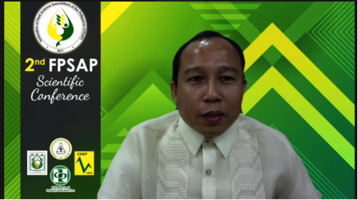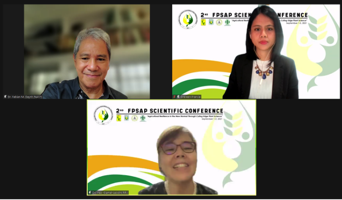 An online scientific conference was organized to promote exchange of ideas on crop science developments and advances. Conducted on September 1-2, 2021, the 2nd Federation of Plant Science Associations of the Philippines, Inc. (FPSAP) Scientific Conference aims to encourage interactions among participants from the government and private sectors, students, researchers, and faculty members from academic institutions.
An online scientific conference was organized to promote exchange of ideas on crop science developments and advances. Conducted on September 1-2, 2021, the 2nd Federation of Plant Science Associations of the Philippines, Inc. (FPSAP) Scientific Conference aims to encourage interactions among participants from the government and private sectors, students, researchers, and faculty members from academic institutions.
The Philippine Council for Agriculture, Aquatic and Natural Resources Research and Development of the Department of Science and Technology (DOST-PCAARRD) supported FPSAP in organizing the said conference, with the theme, “Agricultural Resilience in the New Normal through Cutting Edge Plant Science.”
FPSAP President Roel R. Suralta emphasized in his opening remarks the ongoing efforts in achieving agricultural resiliency and food security by integrating agriculture research for development. Suralta also underscored the importance of sustainably increasing agricultural productivity, enhancing the supply chain, reducing food wastes and losses, and ensuring food and nutrition security.
In his keynote address, Department of Agriculture (DA) Undersecretary Leocadio S. Sebastian underlined the critical role of Philippine agriculture in Filipino livelihood and survival, particularly during the pandemic. Sebastian also emphasized the importance of agriculture modernization agenda of the DA in dealing with agricultural resilience in the new normal. Finally, Sebastian challenged the scientists and researchers to effectively practice science, technology, and innovation (STI) communication and assess technological innovations through the lens of its end-users. The said practice would create healthy STI perceptions among farmers and fisherfolk and, as a result, achieve improved technical capacity, agricultural modernization and ownership, and food security.
Plenary speakers included Dr. Inez Slamet-Leodin, Cluster Leader of the Trait and Genome Engineering unit of the International Rice Research Institute, and National Academy of Science and Technology Academician Fabian M. Dayrit. Slamet-Leodin spoke about the potential benefits of genome editing for crop improvement, highlighting the Clustered Regularly Interspaced Short Palindromic Repeats (CRISPR) Cas9 system. Academician Dayrit focused on the latest research on virgin coconut oil as a functional food against COVID-19.
 The agri-entrepreneurship forum, awarding, and oath-taking ceremony took place during the second day of the conference. Seven seed companies spoke about and showcased their various seed products during the agri-entrepreneurship forum. The awarding ceremony consisted of best paper, best poster, and achievement awards, among others. New members, incoming officers, and the board of directors also took their oath.
The agri-entrepreneurship forum, awarding, and oath-taking ceremony took place during the second day of the conference. Seven seed companies spoke about and showcased their various seed products during the agri-entrepreneurship forum. The awarding ceremony consisted of best paper, best poster, and achievement awards, among others. New members, incoming officers, and the board of directors also took their oath.
Research papers presented during the conference included “Salient Perspective in Breeding for High Zinc and Grain Yield in Rice,” which was awarded first place Best Paper in the downstream category. The following posters also bagged first place during the event: “Suitability of Taro (Colocasia esculenta) and Rice (Oryza sativa L.) Flour Blends for Crinkle Premix Formulation” for the Postharvest/Socio-Economic/Technology Development and Extension category; “Whole Genome Sequencing of Philippine Mango Species for Genome-wide SNP and InDel Analysis” for the Plant Breeding and Genetics category; “Comparative Analysis on the Effects of Explant Type and Tissue Origin on In vitro Regeneration of Tomato (Solanum lycopersicum L.) Line VB-15” under Crop Production and Management/Protection category, and “Native Pigmented Corn: Potential source of Zinc for supplementation to address micronutrient deficiency in the Philippines” under the Crop Physiology and Biochemistry/ Health and Nutrition category.
The DOST-PCAARRD strategic partnership with FPSAP supports the Council's priorities on the crops research agenda under the HNRDA for the AANR sector. The Council awards augmentation funds to qualified professional/scientific and academic organizations that engage in activities that support the Council's advocacies, banner programs, and goals.
